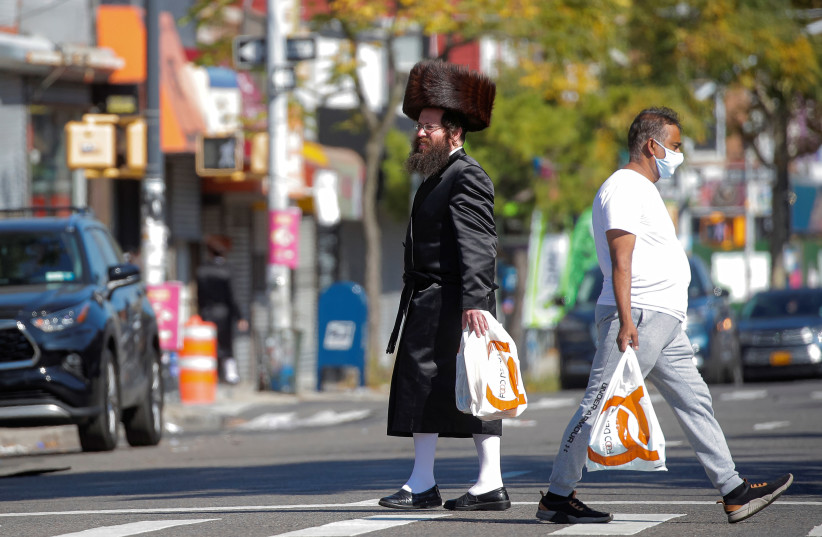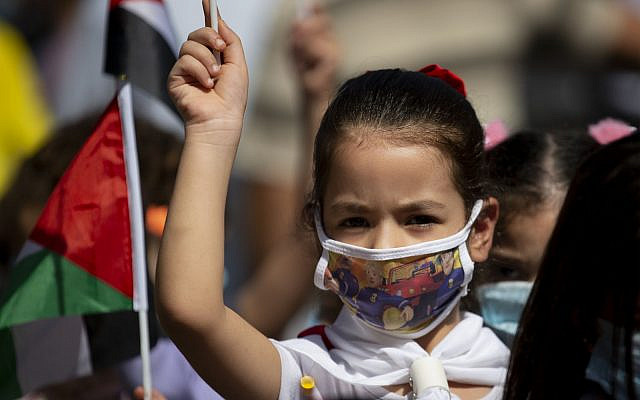 Francesco Hayez, „Zniszczenie Świątyni Jerozolimskiej” (1867)
Francesco Hayez, „Zniszczenie Świątyni Jerozolimskiej” (1867)
 Elu we-elu. Narodziny demokratycznego judaizmu
Elu we-elu. Narodziny demokratycznego judaizmu
JOANNA MARIA MACHEL
DWA TYSIĄCE LAT OPŁAKIWANIA DRUGIEJ ŚWIĄTYNI WYMAZAŁO Z PAMIĘCI WSZELKĄ KRYTYKĘ, JAKĄ KIEROWANO W JEJ STRONĘ, ZANIM ZOSTAŁA ZBURZONA.
Okres na krótko przed i po churbanie (zburzeniu Świątyni) to czas konfliktów, kłótni i dramatycznych zmian w judaizmie. Religia starożytnych Izraelitów, do tej pory w dużej mierze sekciarska, wyszła z tego kataklizmu odmieniona i zjednoczona.
Błędem jednak jest ujmowanie historii judaizmu w sztywno określone ramy: najpierw, do zburzenia Drugiej Świątyni, judaizm biblijny, a potem nagłe przejście w judaizm rabiniczny, który kompletnie różnił się od poprzednika. Religia Żydów istnieje do dziś, ponieważ była w stanie zachować niezmienny rdzeń (Torę), dostosowując się równocześnie do nowych realiów, współgrając z obcymi ideami i redefiniując się w kolejnych epokach. Fundamenty pod współczesny judaizm postawili już wysiedleńcy w Babilonii i prorok Jeremiasz w swoim słynnym, skierowanym do nich liście.
Przez kilkaset lat mieszały się ze sobą różne religijne i polityczne idee, wykluwały się nowe podejścia, a inne umierały. W powiązaniu z wydarzeniami politycznymi, takimi jak utworzenie nowej dynastii Hasmoneuszy czy konflikty między kastami sprawującymi władzę a uczonymi, powstawał nowy judaizm. Zburzenie Świątyni niczego nie stworzyło – było jedynie katalizatorem zmian, które działy się już od kilku pokoleń.
PRZED CHURBANEM
Czytając teksty, które powstały znacznie po churbanie, można odnieść wrażenie, że wszyscy Żydzi bez wyjątku uwielbiali i czcili Świątynię. Regularnie zanosili tam ofiary i szanowali jej kapłanów. W rzeczywistości społeczeństwo żydowskie było bardzo podzielone. Osoby należące do saduceuszy lub z nimi sympatyzujące widziały w Świątyni jedyną formę religijności, a kontrolujący ją kapłani mieli wyłączność na zarządzanie świętymi tekstami i ich interpretacją.
Większość społeczeństwa była jednak nastawiona do saduceuszy sceptycznie lub wręcz wrogo. Postrzegano ich jako zdrajców i kolaborantów, ponieważ bardzo chętnie bratali się z władającymi wówczas Judeą Rzymianami i przejmowali ich zwyczaje. Od wielu pokoleń wśród Żydów byli mędrcy i nauczyciele, którzy głosili, że każdy może uczyć się Tory, a Świątynia to miejsce skorumpowane i niekoszerne. Osoby te oferowały inne sposoby na budowanie relacji z Bogiem – skrupulatne przestrzeganie praw czystości duchowej, studiowanie Tory i modlitwę. Odrzucały zaś składanie ofiar w nieczystej Świątyni, a ołtarze tworzyły na własnych stołach.
Jeszcze inne grupy nie zgadzały się nawet z tym podejściem i jedynie w całkowitej izolacji widziały szansę na święte życie. Zakładano komuny na pustyni, aby w ściśle określonej regułami religijnymi społeczności czekać na przyjście kogoś, kto ocali wszystkich. W tym przypadku Świątynią była cała społeczność, a życie w niej stanowiło rytuał ofiarny.
Każda z sekt uważała, że to ona jako jedyna wyznaje właściwą formę judaizmu, a wszystkie inne są nieczyste i błędne. Głównym przedmiotem sporów – elementem, który rozpalał gniew i uniemożliwiał pojednanie – były prawa związane ze Świątynią. Nie było tutaj miejsca na kompromis czy akceptację odmiennych postaw.
PO CHURBANIE
Zniszczenie Świątyni było tragedią dla wszystkich grup – nawet jeśli uważały ją za (tymczasowo) nieczystą. Wraz z runięciem murów zniknęło uświęcone centrum kosmosu, symbol Bożej opieki i obecności. Wydawało się, że Rzymianie i ich bogowie zwyciężyli nad pozbawionym mocy Izraelem i ich Stwórcą.
Do problemów natury teologicznej należy dołączyć te związane z konsekwencjami walk i wojen. Najdotkliwiej odczuwano je w Jerozolimie i okolicach – zniszczenia i liczne aresztowania musiały znacząco wpłynąć na życie mieszkańców tych terenów. Wraz ze stratami materialnymi wojna przyniosła kres istniejącym strukturom społecznym i narodowym.
„JAWNE I JEJ MĘDRCÓW”
Według znanej legendy raw Jochanan ben Zakaj podstępem wydostał się z oblężonej Jerozolimy, a generał Wespazjan w podziękowaniu za przychylną przepowiednię obiecał mu swą pomoc. Raw Jochanan poprosił o „Jawne i jej mędrców”, czyli miasteczko, w którym mieściła się słynna akademia. Mając przed sobą wizję całkowitego zniszczenia Jerozolimy, Jochanan postanowił ratować to, co według niego było duszą narodu: Torę i jej interpretacje.
Przez kilkadziesiąt lat działała tzw. koalicja z Jawne. Należeli do niej Żydzi z różnych grup – zarówno faryzeuszy, jak i saduceuszy oraz innych pomniejszych sekt i społeczności.
Panuje przekonanie, że po churbanie grupa faryzeuszy była jedyną, która przetrwała kataklizm. Że Sanhedryn z Jawne „wyczyścił” judaizm z innych sekt, wyeliminował niebezpieczne księgi (słowem – dokonał kanonizacji) i ustalił, co jest „ortodoksją”, a co znajduje się poza jej ramami. Tak jednak nie było. Faryzeusze z pewnością stanowili największą grupę, ale nie jedyną. Po przegranej wojnie różnice między odłamami przestały być istotne. Zasada była jedna: albo odrzucasz stare sekciarstwo, albo musisz odejść.
Uczeni, którzy zgromadzili się, aby kontynuować naukę i zaadoptować judaizm do nowej sytuacji, wykazali się niesamowitą przenikliwością i zdolnością analizy. Nie bez powodu uczymy się, że przyczyną zniszczenia Drugiej Świątyni było sinat chinam – „nienawiść bez powodu”. Rabini rozumieli, do czego doprowadziła owa nienawiść i podejście „my albo nikt”. Z poczucia odpowiedzialności za przyszłe pokolenia porzucono spory sprzed churbanu i zaczęto budować.
Świątynia – największy punkt zapalny – przestała istnieć. Nie było już powodu, aby się o nią kłócić. Mędrcy, zamiast przesadnie skupiać się na przeszłości, starali się pomóc swym współbraciom w radzeniu sobie z nową rzeczywistością.
NOWE ZASADY
Rabini nie budowali niczego od podstaw. Nie tworzyli nowej religii. Wykorzystali znane struktury, dostosowując je do nowych potrzeb. Synagogi istniały już od dawna – pierwsze zaczęto budować w czasie niewoli babilońskiej (nazywano je tam mikdasz meat, „małą świątynią”). Żydzi powracający do Ziemi Izraela stawiali je w swoich wioskach. Nie widziano w nich konkurencji dla Świątyni, gdyż służyły całkowicie innym celom. Nigdy nie składano w nich ofiar. Miały charakter demokratyczny, ich głównym zadaniem było skupianie lokalnej ludności. Przychodzono tam, aby posłuchać wędrownych nauczycieli czy spotkać się z okazji świąt i większych wydarzeń. Powoli powstawał kanon modlitw, które odmawiano poza Świątynią. Mędrcy interpretowali Torę i nauczali, że każdy Żyd ma do niej prawo. Religia okresu Drugiej Świątyni była pod silnym wpływem przeżyć wygnania babilońskiego, kiedy to zasiane zostały zmiany, które rozkwitły w pełni pod koniec panowania Hasmoneuszy i po 70 r. n.e.
Po zburzeniu Świątyni znaczenie synagog wzrosło. Uniknięto za ich pomocą poczucia nagłej pustki – stanowiły filar, o który można było się oprzeć. Dzięki temu, że faryzeusze już wcześniej budowali rytuał świąteczny poza murami Świątyni, teraz istniały już gotowe rozwiązania. Stopniowo odchodzono od wymogów obrzędu ofiarnego i, używając jako fundamentu cytatów z Tanachu (szczególnie z proroków), przekierowano praktykę judaistyczną na nowe tory. Część rytuału świątynnego trafiła do domów i synagog, chociażby tradycje związane z lulawem (na święto Sukot) czy dęciem w szofar.
Nie mamy dokładnych danych na temat tych kluczowych lat tuż po churbanie. Pierwsze zapisy pochodzą z Miszny, którą spisano około stu lat później. Nie wiemy, jak dramatyczne było leczenie z podziałów i kierowanie się ku demokratyzacji i pluralizacji dysput. Wiemy natomiast, że po kilkudziesięciu latach środowisko mędrców wyłoniło się jako przywódcy społeczeństwa i narodu. To oni ukształtowali praktyczne prawo żydowskie.
LO BA-SZAMAJIM HI
Rabini stworzyli nową metodę współpracy. Zamiast „albo moja interpretacja prawa, albo żadna”, przyświecała im teraz zasada „zgadzamy się, że mamy różne opinie”. W Misznie i Talmudzie odnotowano postawy mniejszościowe, które zostały odrzucone – jeśli autorzy tych opinii zaakceptowali decyzję większości, mogli pozostać we wspólnocie, a ich słowa miały szansę przetrwać. Przyjmowano zdanie większości, ale pozwalano na sprzeciw i różnice w interpretacji Tory. Nie akceptowano za to braku woli do kompromisu.
Jedną z najważniejszych agadot obrazujących tę postawę jest słynna opowieść o piecu Achnaja (Tanur szel Achnaj). Rabi Eliezer nie zgadza się w niej z opinią większości. Prosi Niebiosa o wsparcie jego stanowiska, rabini jednak nie chcą przyjąć objawionych im cudów za argumenty w sporze. W końcu bat kol (głos z nieba) oburza się, dlaczego Chachamim nie chcą przyjąć opinii Eliezera, skoro popiera go sam Bóg. Oni jednak odpowiadają: Lo ba-szamajim hi – „Ona [Tora] nie jest w niebie” (TB, tr. Bawa Mecija 59b). Skoro Bóg przekazał ludziom Torę (wraz z instrukcją, jak ją interpretować), teraz należy ona do nich i nie ma już miejsca na cuda i nadprzyrodzone argumenty. Skoro sam Bóg napisał w Torze, „aby się skłaniać ku większości” (Szemot 23:2), pozostaje tylko dyskusja i demokratyczne głosowanie. Rabi Eliezer został ekskomunikowany, lecz nie dlatego, że nie zgadzał się z Mędrcami, ale ponieważ nie był w stanie pogodzić się ze swoją przegraną w głosowaniu.
ELU WE-ELU
Kolejną historią obrazującą nowy, pluralistyczny stan rzeczy, jest opowieść o sporach szkół Hilela i Szamaja. Konflikt między nimi był tak głęboki, że mówiono nawet o istnieniu w Izraelu dwóch Tor. W końcu, aby pogodzić zwaśnione strony i zaprowadzić pokój, bat kol oznajmia: „i te, i te [opinie] są słowami żywego Boga (elu we-elu diwrej Elohim chajim), ale halacha jest według domu Hilela” (TB, tr. Eruwin 13b). Idea, że możliwe jest odrzucenie opinii pochodzącej od samego Boga i nie grozi za to wyrzucenie poza nawias społeczności żydowskiej, była prawdziwie rewolucyjna. Nastąpiło całkowite odejście od sekciarstwa sprzed zburzenia Świątyni.
REWOLUCJA/ NIE-REWOLUCJA
Choć używam tu słowa „rewolucja”, rabini nie wymyślili niczego nowego. Nie stworzyli nowej religii, która jedynie przypominała tę z czasów Świątyni. Byli w stanie umiejętnie budować na istniejących już fundamentach, rozwijając idee, które istniały w łonie społeczności żydowskiej od setek lat. Wykorzystali elementy, z którymi ludzie byli już dobrze zaznajomieni (synagogi, częściowy rytuał świąteczny czy modlitwy), rozszerzając ich funkcje bądź reinterpretując ich znaczenie. Modlitwy stały się zamiennikiem ofiar składanych regularnie w Świątyni, podobnie jak akty dobroczynności i wspierania biednych.
PRENUMERATA
 Aby nie popaść w paraliżującą żałobę po tragedii zburzenia Świątyni, Raban Gamliel zalecił symboliczne wyrażanie bólu po stracie, z którą jesteśmy w stanie nauczyć się żyć. Wzorując się na proroku Jeremiaszu, który wygnańcom babilońskim doradzał sadzenie winorośli, budowanie domów i pracę dla dobra kraju, Gamliel nakazał, aby żyć dalej, ale nie zapominać.
Aby nie popaść w paraliżującą żałobę po tragedii zburzenia Świątyni, Raban Gamliel zalecił symboliczne wyrażanie bólu po stracie, z którą jesteśmy w stanie nauczyć się żyć. Wzorując się na proroku Jeremiaszu, który wygnańcom babilońskim doradzał sadzenie winorośli, budowanie domów i pracę dla dobra kraju, Gamliel nakazał, aby żyć dalej, ale nie zapominać.
Z religii opartej na kulcie świątynnym, w której mała grupa wybrańców miała status pośredników i strażników dostępu do boskości, rabini byli w stanie przekształcić judaizm w religię prawdziwie demokratyczną. Od teraz każdy Żyd miał być panem swojej duchowości. Mędrcy poprzez strukturę modlitw oraz nacisk na studiowanie Tory otworzyli niejako „bramy Nieba” dla wszystkich. Pokazali, że można spierać się na gruncie interpretacji prawa, pozostając jednocześnie w ramach tej samej religii, bez potrzeby wykluczania i tworzenia nowych, wrogich wobec siebie sekt. Pozycje mniejszościowe są zapisywane w świętych tekstach, a ich autorzy nie są wyrzucani poza nawias, jeśli tylko zaakceptują, że większość może się z nimi nie zgodzić. Historia o koalicji rabinów z Jawne jest dającym nadzieję przykładem na to, że grupowe wyciąganie wniosków z popełnianych błędów jest możliwe. Jeśli w swych działaniach będziemy kierować się szczerą troską o przyszłość bliskich, uratujemy duszę narodu.
Zawartość publikowanych artykułów i materiałów nie reprezentuje poglądów ani opinii Reunion’68,
ani też webmastera Blogu Reunion’68, chyba ze jest to wyraźnie zaznaczone.
Twoje uwagi, linki, własne artykuły lub wiadomości prześlij na adres:
webmaster@reunion68.com




